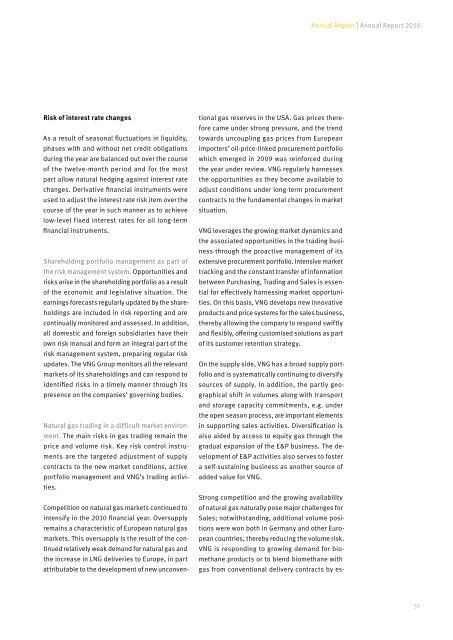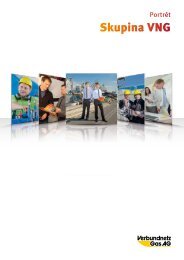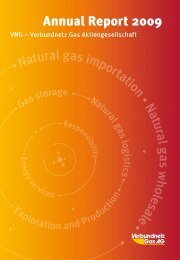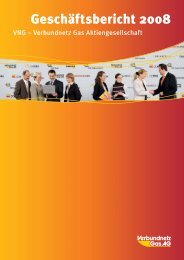Annual Report 2010 311 - Verbundnetz Gas AG
Annual Report 2010 311 - Verbundnetz Gas AG
Annual Report 2010 311 - Verbundnetz Gas AG
You also want an ePaper? Increase the reach of your titles
YUMPU automatically turns print PDFs into web optimized ePapers that Google loves.
<strong>Annual</strong> <strong>Report</strong> | <strong>Annual</strong> <strong>Report</strong> <strong>2010</strong><br />
Risk of interest rate changes<br />
As a result of seasonal fluctuations in liquidity,<br />
phases with and without net credit obligations<br />
during the year are balanced out over the course<br />
of the twelve-month period and for the most<br />
part allow natural hedging against interest rate<br />
changes. Derivative financial instruments were<br />
used to adjust the interest rate risk item over the<br />
course of the year in such manner as to achieve<br />
low-level fixed interest rates for all long-term<br />
financial instruments.<br />
Shareholding portfolio management as part of<br />
the risk management system. Opportunities and<br />
risks arise in the shareholding portfolio as a result<br />
of the economic and legislative situation. The<br />
earnings forecasts regularly updated by the shareholdings<br />
are included in risk reporting and are<br />
continually monitored and assessed. In addition,<br />
all domestic and foreign subsidiaries have their<br />
own risk manual and form an integral part of the<br />
risk management system, preparing regular risk<br />
updates. The VNG Group monitors all the relevant<br />
markets of its shareholdings and can respond to<br />
identified risks in a timely manner through its<br />
presence on the companies’ governing bodies.<br />
Natural gas trading in a difficult market environment.<br />
The main risks in gas trading remain the<br />
price and volume risk. Key risk control instruments<br />
are the targeted adjustment of supply<br />
contracts to the new market conditions, active<br />
portfolio management and VNG’s trading activities.<br />
Competition on natural gas markets continued to<br />
intensify in the <strong>2010</strong> financial year. Oversupply<br />
remains a characteristic of European natural gas<br />
markets. This oversupply is the result of the continued<br />
relatively weak demand for natural gas and<br />
the increase in LNG deliveries to Europe, in part<br />
attributable to the development of new unconventional<br />
gas reserves in the USA. <strong>Gas</strong> prices therefore<br />
came under strong pressure, and the trend<br />
towards uncoupling gas prices from European<br />
importers’ oil-price-linked procurement portfolio<br />
which emerged in 2009 was reinforced during<br />
the year under review. VNG regularly harnesses<br />
the opportunities as they become available to<br />
adjust conditions under long-term procurement<br />
contracts to the fundamental changes in market<br />
situation.<br />
VNG leverages the growing market dynamics and<br />
the associated opportunities in the trading business<br />
through the proactive management of its<br />
extensive procurement portfolio. Intensive market<br />
tracking and the constant transfer of information<br />
between Purchasing, Trading and Sales is essential<br />
for effectively harnessing market opportunities.<br />
On this basis, VNG develops new innovative<br />
products and price systems for the sales business,<br />
thereby allowing the company to respond swiftly<br />
and flexibly, offering customised solutions as part<br />
of its customer retention strategy.<br />
On the supply side, VNG has a broad supply portfolio<br />
and is systematically continuing to diversify<br />
sources of supply. In addition, the partly geographical<br />
shift in volumes along with transport<br />
and storage capacity commitments, e.g. under<br />
the open season process, are important elements<br />
in supporting sales activities. Diversification is<br />
also aided by access to equity gas through the<br />
gradual expansion of the E&P business. The development<br />
of E&P activities also serves to foster<br />
a self-sustaining business as another source of<br />
added value for VNG.<br />
Strong competition and the growing availability<br />
of natural gas naturally pose major challenges for<br />
Sales; notwithstanding, additional volume positions<br />
were won both in Germany and other European<br />
countries, thereby reducing the volume risk.<br />
VNG is responding to growing demand for biomethane<br />
products or to blend biomethane with<br />
gas from conventional delivery contracts by es-<br />
31





